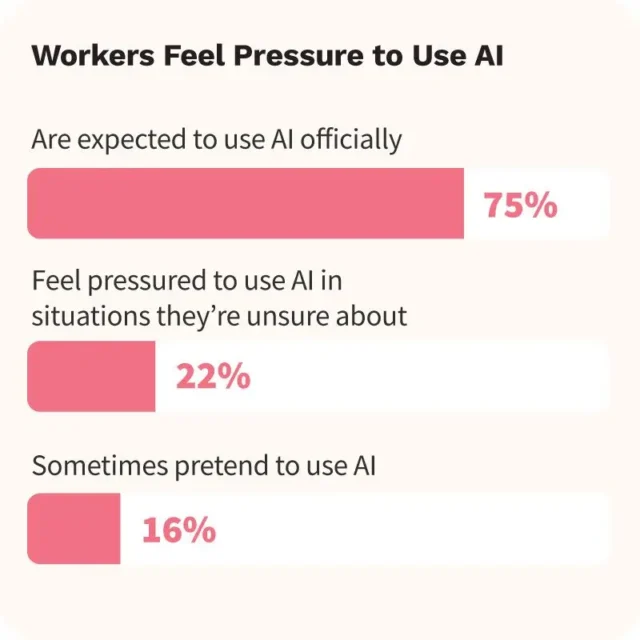Some employees feel so pressured to use AI, they're pretending they are

A new survey of more than 1,000 full-time professionals across the USA highlights widespread AI adoption at work and reveals the growing pressures that come with it. While most workers report benefits, others struggle to keep pace with the changes.
Artificial intelligence has become a fixture in white-collar jobs across the country. A new survey shows that 75 percent of full-time workers are expected -- officially or unofficially -- to use AI tools at work.
SEE ALSO: AI moves from optional to essential in cybersecurity, according to new findings
Among them, many are adapting with enthusiasm, but not all experiences are positive. A notable number of workers say they feel overwhelmed, undertrained, or even misled about what AI use should look like in practice.
The study, by Howdy.com, reveals that 84 percent of workers feel more productive thanks to AI. Many say they are less stressed and experience less burnout. In fact, 72 percent say they feel more energized in their roles, and 69 percent report an increase in overall job satisfaction.
For some, AI has become a daily companion. Over half of those surveyed say they use AI at least once a day, and 13 percent report they use it constantly throughout the workday.
This AI boom inevitably comes with personal and professional costs. More than half of respondents say they use their own money to pay for better tools, spending an average of $68 each month. Some do so willingly, while others may feel it is the only way to meet expectations.
Not everyone is comfortable with these expectations either. About 22 percent of respondents say they feel pressured to use AI in ways that make them uneasy.
Rather than speaking up about their concerns, 16 percent admit they sometimes pretend to use AI when they actually aren't, which suggests organizations are not managing AI training and support as well as they should be.

Among those expected to use AI, a quarter say they received no training at all. While some workers were given formal instruction or dedicated time to explore AI tools, the experience is uneven. Still, 92 percent of employees said they generally agree with how their leadership is approaching AI implementation, suggesting broad buy-in despite some gaps.
AI is now so central to many jobs that some workers feel it shapes their work identity. For most, that identity has improved. About a third say AI helps them collaborate more and feel less isolated. Some even view AI as a helpful partner.
On the other hand, 9 percent say AI has damaged their sense of self-worth. These workers may feel left behind, unsure of how to compete in a workplace that values fluency with new technology.
Overwhelmed by AI
The pace of change is also a factor. A full 25 percent of workers say they often or always feel overwhelmed by AI developments.
Another third report that using AI can take as much time as traditional methods, especially when learning and verifying results are factored in. These mixed experiences show that AI isn’t always a shortcut, it can be just as complex as the tasks it replaces.
Yet despite the pressures, most professionals still say AI is worth it. 83 percent believe it is a good investment, especially when it comes to improving creativity and problem-solving at work. For them, the trade-offs are manageable, and the potential is still unfolding.
As AI tools continue to develop, companies will likely face growing pressure to offer consistent training, clear expectations, and better support for those who are struggling. For now, it seems the landscape remains a mix of excitement and uncertainty, with most workers embracing AI, even if not everyone feels fully equipped to use it.
What do you think about AI in the workplace? Let us know in the comments.
Image Credit: Yaroslav Piatkivskyi / Dreamstime.com
